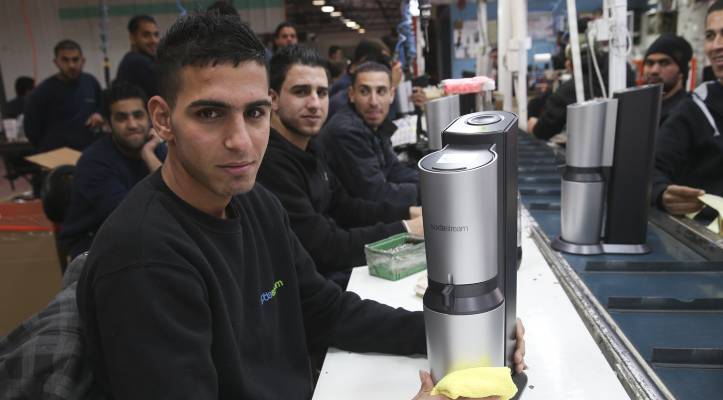The chief executive of SodaStream, the Israeli beverage maker that is shuttering its Judea factory in the face of international boycott calls, accused his company’s critics of anti-Semitism and hurting the interests of the Palestinian workers they claim to protect.
SodaStream, which produces machines that allow people to make fizzy drinks, has been targeted by an international campaign calling for boycotting, divesting and sanctioning Israeli companies. Citing financial reasons, SodaStream announced it was closing the West Bank factory last year, but the so-called BDS movement declared victory and said its pressure was behind the decision.
Standing in the sprawling new factory deep in Israel’s Negev Desert that will replace the West Bank facility when it shuts down in two weeks, CEO Daniel Birnbaum said the boycott movement has only had a “marginal” effect on his business. He accused the BDS movement of spreading lies and said Palestinian employees were given pay and benefits far higher than anything else they could find in the West Bank.
“It’s propaganda. It’s politics. It’s hate. It’s anti-Semitism. It’s all the bad stuff we don’t want to be part of,” Birnbaum said.
The BDS movement has grown into a worldwide network of thousands of volunteers lobbying corporations, artists and academic institutions to sever ties with Israel. It has three goals: ending Israel’s occupation of territories captured in the 1967 Mideast war, ending discrimination suffered by Arab citizens of Israel and promoting the rights of Palestinian refugees to return to family properties lost in the war surrounding Israel’s creation in 1948.
Israel says the Palestinian “right of return” would lead to a massive influx of refugees that would mean the end of the country as a Jewish state.

Palestinian and Jewish workers eat together at a SodaStream factory. (Nati Shohat/Flash90)
For the BDS movement, SodaStream’s pullout from the West Bank was part of a domino effect that will see more companies sever interests to spare their bottom line.
“This is a clear-cut BDS victory against an odiously complicit Israeli company,” said Omar Barghouti, a co-founder of the movement. He said it would continue to target SodaStream because its new factory is located in an area where Israel has in the past proposed to resettle Bedouin Arabs. The company employs more than 300 Bedouins.
SodaStream made headlines last year when actress Scarlett Johansson parted ways with the international charity Oxfam because of a dispute over her work as brand ambassador for the Tel Aviv-based company. Birnbaum said the relationship with Johansson was for a limited time and ended shortly after.
After enjoying years of growth, SodaStream’s revenue dropped drastically in 2014 and its stock price continues to fall. Birnbaum rejected suggestions that BDS pressure has hurt the company, attributing the slump to a changing U.S. market that is moving away from sugary drinks. He said the company is trying to reposition itself as a provider of a healthy product, instead of a rival to heavyweights like Coca-Cola Co.
The company sells its product in some 70,000 stores worldwide, with some of its deepest market penetration in countries where BDS appears to have the most support, including Sweden.
Birnbaum said the impact of the boycotters has been negligible. He said chains with some 1,000 stores in Japan and France dropped his product, and Swedish retailers opposed to the West Bank facility insisted on selling machines made in China.
Ahead of the West Bank factory’s closure in two weeks, the Israeli factory hummed with activity on Wednesday. Palestinian managers watched as veiled Bedouin women and mohawk-sporting Ethiopian Jews toiled on an assembly line. The whir and hiss of machines mingled with Arabic and Hebrew.
SodaStream employed up to 600 Palestinians at the West Bank factory and sought to transfer their jobs to the Israeli plant. But Birnbaum said Israel has granted only 130 work permits so far due to security issues. Many likely will lose their jobs.
“All the people who wanted to close (SodaStream’s West Bank factory) are mistaken. … They didn’t take into consideration the families,” said Ali Jafar, a shift manager from a West Bank village who has worked for SodaStream for two years.
Palestinians, like other employees, are offered a bus service that brings them to the factory. But what was once a short jaunt to the West Bank factory is now a two-hour journey each way that involves crossing an Israeli checkpoint, where workers must show their permits and be screened for security checks.
BDS has accused SodaStream of paying Palestinian workers less than their Israeli counterparts, but Birnbaum and employees at the factory said wages for Palestinians and Israeli workers are commensurate.
“SodaStream should have been encouraged in the West Bank if (the BDS movement) truly cared about the Palestinian people,” Birnbaum said.
By: Tia Goldenberg, AP
